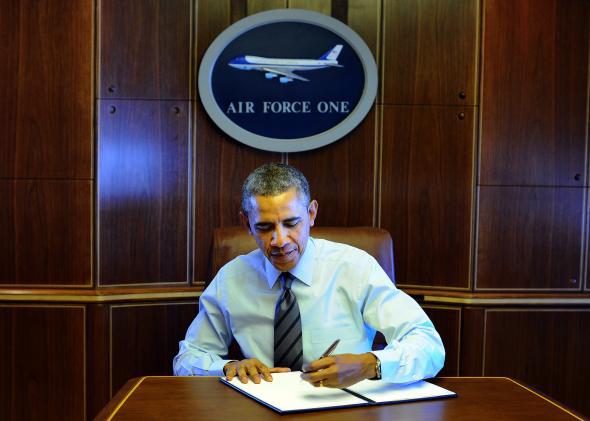Every so often, mainstream LGBTQ-rights group Human Rights Campaign repeats its call for President Barack Obama to sign an executive order banning discrimination against gay, lesbian, bisexual, and transgender individuals employed by federal contractors. Seems like a great idea, right? Not so fast. At best, an executive order could help only a small number of LGBTQ workers in the short time remaining for the Obama administration, and in the long run it might end up hurting the same federal contractors it was designed to protect.
Before I go any further, let me stipulate to a personal dislike of executive orders as a method of achieving political goals. Our system of government was designed to resist the tyranny of kings by placing the power to make new laws in the hands of Congress. Relying on executive orders to create change on important issues undermines the legislative process and further concentrates power in the executive branch. And when it comes to ending workplace discrimination based on sexual orientation or gender identity, an excellent bill that would do just that in companies with more than 15 employees has already been approved by the Senate. While ENDA may be stalled in the House, supporters of LGBTQ rights agree that the ultimate goal is to pass legislation designed to end workplace discrimination for everyone, not just those on the federal payroll.
Still, wouldn’t it be better to take a small step now, by whatever means necessary? In the last few years of Obama’s presidency, the practical benefits to workers would necessarily be pretty minor. On the other hand, engaging in this sort of feel-good symbolism could easily initiate a backlash down the line. Sooner or later there’ll be a Republican in the White House, and given the GOP’s ongoing need to satisfy the homophobes in the religious right, its recent penchant for enshrining a right to discriminate at the state level, and the fact that likely candidates from Marco Rubio to Rand Paul are on record opposing anti-discrimination protections for LGBTQ workers, it’s reasonable to conclude that a Republican president might reverse any order President Obama signs. And a moderate candidate is no protection—I still remember the time when my “moderate” governor, Mitt Romney, cut funding for suicide prevention as a way of increasing his credibility with social conservatives before his first presidential run.
A relevant precedent here is the Mexico City Policy, an order that bars federal funding for abortion, or the promotion of abortion, by groups supporting family planning efforts overseas. This order has been repeatedly toggled off and on by presidents of opposing parties since its initial signing by Ronald Reagan, and it will most likely continue to be signed and revoked until the rapture. (Right now, it’s not in effect.)
This partisan push and pull over funding for overseas abortions is bad enough, but in the case of workplace discrimination against sexual minorities here in the United States, real harm could come to LGBTQ folks working or seeking employment with federal contractors. A Republican president’s reversal of the order could signal to contractors that discrimination is a way to curry favor. When weighed against the small scope of an order that can only be trusted to remain in effect for less than three years, the risks of politically motivated discrimination by contractors under a GOP administration seem significant enough to bear consideration.
Passing ENDA may be the harder road, but it’s the only one that will lead to real protections for all LGBTQ workers. Activists need to accept that there may not be much that the current president can do to end discrimination aimed at our community and redouble their efforts to build bipartisan support for the sort of legislation that could actually make a difference.
